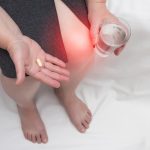Popular arthritis supplement offers UNEXPECTED health benefits
 (NaturalHealth365) Heart disease remains the leading killer in the United States, claiming over 655,000 lives a year. In addition, 54 million people – almost a quarter of all American adults live with the painful, potentially debilitating disease of arthritis, the leading cause of work disability in the nation. Now, in a stroke of medical serendipity, it appears that a popular supplement may benefit both conditions at once.
(NaturalHealth365) Heart disease remains the leading killer in the United States, claiming over 655,000 lives a year. In addition, 54 million people – almost a quarter of all American adults live with the painful, potentially debilitating disease of arthritis, the leading cause of work disability in the nation. Now, in a stroke of medical serendipity, it appears that a popular supplement may benefit both conditions at once.
An encouraging new study shows that glucosamine and chondroitin, commonly used to treat the pain and inflammation of arthritis, can also do “double duty” in reducing the risk of heart disease and the risk of death from cardiovascular disease conditions. Let’s take a closer look at the promising research.
Glucosamine supplementation linked to SURPRISING health effects
The study, conducted by researchers at West Virginia University and published in the Journal of the American Board of Family Medicine, involved over 16,000 adults over age 40. After adjusting for age, sex, race, education, smoking status, and physical activity, the researchers came to a stunning conclusion.
They found that participants who took glucosamine and chondroitin daily for a year reduced the risk of death from any cause – by an astounding 39 percent. The supplementation also reduced cardiovascular deaths – including death from coronary artery disease, stroke, and other forms of heart disease – by 65 percent. In fact, glucosamine/chondroitin supplementation worked about as well as regular exercise in reducing the risk of death (although the researchers do not recommend that people forego exercising in favor of glucosamine).
“Does this mean…you should skip the gym (after work), take a glucosamine pill, and go home instead? That’s not what we suggest,” said study leader Dana King, professor and chair of the Department of Family Medicine at WVU.
Still, Dr. King called the study results “encouraging” and characterized the impact as “pretty significant.”
Glucosamine and chondroitin protect against deadly heart disease and strokes
The researchers’ interest had been piqued by earlier studies, which involved participants taking the supplement for arthritis pain. Scientists conducting the research found that there were substantial associations between intake of glucosamine/chondroitin and mortality.
In one 2019 study published in British Medical Journal, the scientists noted that glucosamine/chondroitin given for arthritis pain also significantly lowered the risk of heart disease and stroke. Specifically, the supplementation lowered the risk of adverse cardiovascular events by 15 percent, cardiovascular-related deaths by 22 percent, and coronary heart disease by 18 percent. For the WVU study, researchers took things a step further by setting out to further explore the link between regular consumption and mortality from cardiovascular conditions.
Beneficial multi-tasking: Glucosamine and chondroitin protect both the joints and cardiovascular system
Glucosamine and chondroitin already exist naturally in the joints and synovial fluid, where they are necessary for the formation, lubrication, and preservation of protective, bone-cushioning cartilage.
With osteoarthritis, this cartilage wears down and causes painful contact between the bones in the joints. Glucosamine and chondroitin have shown the ability to treat the inflammation and cartilage loss of the condition. As a result, they can slow joint degeneration, reduce pain and tenderness, and even help rebuild stronger bones after fracture or injury. (By the way, glucosamine/chondroitin supplementation has also been shown to benefit the gut lining, thereby treating leaky gut and IBD as well).
But, what accounts for glucosamine’s ability to protect the heart?
Researchers have found that glucosamine and chondroitin are powerful natural antioxidants and anti-inflammatory agents. They have been shown to reduce both oxidative stress and levels of C-reactive protein (an inflammatory marker associated with heart disease). In addition, they can help suppress pro-inflammatory cytokines, which could otherwise trigger disease-causing systemic inflammation. Supplementation has also been shown to reduce levels of harmful LDL cholesterol, potentially reducing the development of atherosclerosis that leads to heart disease.
For maximum benefit, choose the right type of glucosamine supplement
Glucosamine and chondroitin supplements are made from chitin, a compound found in shellfish. Natural healers typically recommend supplementation with 1,500 mg a day of glucosamine and 1,200 mg a day of chondroitin (many products conveniently feature these two compounds together). Note: Most experts feel that the glucosamine sulfate is superior to other formulations, such as glucosamine hydrochloride and N-acetyl glucosamine. Of course, check first with your integrative doctor before supplementing. And, if you are allergic to shellfish, don’t use glucosamine or chondroitin.
You can also increase your dietary intake of glucosamine and chondroitin with nourishing bone broth.
Remember, long-term, regular use of these supplements seems to yield the most benefits. Be aware that it may take eight to twelve weeks before improvements begin to appear.
Of course, more study is needed to further explore the life-prolonging benefits of glucosamine and chondroitin. And, supplementation doesn’t appear to work for all osteoarthritis patients – some studies have shown unimpressive results. However, many people swear by them for their ability to ease pain and stiffness.
As for Dr. King, the lead author of the recent WVU study? The physician not only strongly recommends glucosamine and chondroitin – but goes a step farther, acknowledging he regularly takes the supplement himself.
Now, that’s a solid endorsement.
Sources for this story include:



